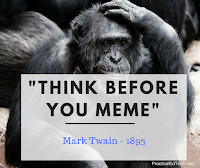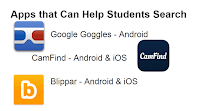An Overview of Microsoft’s Search Coach

Last summer Microsoft announced a new Teams product that would be rolling to education users over the coming school year. That product is called Search Coach and it appears to now be widely available to all Microsoft Teams education users. As its name implies, Search Coach in Microsoft Teams provides students with tips to improve […]
Try Using Vocabulary Lists to Help Your Students Conduct Better Searches

This is an excerpt from this week’s Practical Ed Tech Newsletter. I’m in the process of updating my Search Strategies Students Need to Know online course. In the process of doing so I revisited a good article that I read a few years ago. That article is Characterizing the Influence of Domain Expertise on Web Search […]
Patent Search and Five Other Google Scholar Features Students Should Know How to Use

Unlike search results on Google.com, Google Scholar search results isn’t a ranking of websites. Instead, Google Scholar search results are lists of scholarly articles related to your query. Google Scholar can also be used to locate United States patent filings as well as state and federal court cases. When looking at Google Scholar search results […]
Why You Should Try Refining Searches According to File Type

Much like refining Google search results according to site or domain, refining search results according to file type is a good way to discover information that is helpful but doesn’t rank well in Google search results. For example, Google Earth files often contain interesting historical and geological facts placed in a geographic context. A classic […]
Why You Should Try Refining Search Results According to Domain

Refining Google search results according to site or domain can be a fantastic way for teachers and students to locate websites that they might not otherwise find but still contain useful information. This is because, as we know, a website can have excellent information about a topic but not rank well in Google search results. […]
Other Search Engines for Students to Try

While Google is the default search engine for many students (either mentally or technically because of browser settings), there are other public search engines for them to use. In some cases using an alternate search engine will give students a different list of results and or may give them the information they’re seeking a little […]
How to Refine DuckDuckGo Search Results

DuckDuckGo is becoming a popular alternative to conducting searches on Google.com. The reason for that popularity is a reflection of DuckDuckGo’s claim to not track search habits of individual users. While it is a good search engine, it still has a way to go to compete head-to-head with Google’s advanced search options. That said, there […]
Why You Should Refine Search Results by Language, Region, and Date

Google’s Advanced Search menu offers more than just tools for refining your search terms. In the Advanced Search menu you’ll find tools for refining search results according to language, region of publication, recency of updates, site or domain, filetype, usage rights, where search terms appear, and exclusion of explicit results. Some of those filters and […]
Challenge – Introduce Students to Academic Search Engines and Databases

In the minds of many students yelling “Hey Siri, tell me about Martin Luther King, Jr.” or “Hey Google, when did the Soviet Union collapse?” is conducting research. As teachers we know that research is a process that goes far beyond telling a machine to give us some information. The challenge is to get students […]
How to Find Published Google Workspaces Files

Refining Google searches according to domain is one of my favorite ways to get students to look beyond the first couple of pages of their typical Google search queries. Students can specify site or domain in Google’s advanced search menu to limit results to those that are only from top-level domains like .edu. They can […]
Five Search Tools Students Often Overlook

In our new remote teaching and learning environments students may find themselves having to look things up online more than ever before. Even if you’re hosting online class meetings in Zoom, Google Meet, or Microsoft Teams there will still be lots of time when students need to do some research on their own. This is […]
Another Approach to Creating Search Challenges for Students

Yesterday afternoon I shared one of my approaches to creating search practice activities for students. That strategy involves using pictures to tell as story and have students answer some questions based on the story and picture. Another approach that I use is to have students ask the questions that they want to know the answers […]
My Approach to Creating Search Practice Activities for Students

This week’s Practical Ed Tech Tip of the Week Newsletter featured ten Google search tips for students. It’s all well and good to give those tips to students and show them how to use them, but for the tips to really sink in students should get some practice using them. To that end, you can […]
Diving Into Google – Learn Search Techniques from Dan Russell

Longtime followers of this blog may have picked up on my appreciation for Dan Russell’s excellent Search ReSearch blog where he posts interesting search challenges designed to help readers become better web researchers. His forthcoming book, The Joy of Search, is sure to be excellent too. If you’re not familiar with Dan’s work or you […]
The Joy of Search – Get a Sample Chapter and Learn a Great Search Strategy

The Joy of Search is the title of Dan Russell’s forthcoming book about search strategies. I pre-ordered my copy from Amazon about six weeks ago and am eagerly anticipating its arrival this fall. Dan Russell’s official title is Senior Research Scientist for Search Quality and User Happiness at Google. What he does that you, I, […]
More About Sub-image Searching
Last week I wrote a post about using the search strategy of sub-image searching to identify the meaning of the lettering on a tea set that a friend of mine had purchased at a flea market. It’s a strategy that I learned many years ago from Dan Russell and was reminded about when I heard […]
Google Dataset Search – Locate Publicly Available Datasets

Google Dataset Search is a search tool that I learned about this week during one of Daniel Russell’s presentations at the TLA conference. Google Dataset Search is a new (still in beta) search tool that is designed to help users locate publicly available datasets. This isn’t a tool for searching within the datasets, it’s a […]
Sub-image Search – A Strategy for Answering “What Is This?”

Image Credit: Becky Willough Earlier this week I had the good fortune to sit in on two presentations at TLA given by Daniel Russell. He is Google’s Senior Scientist in charge of search quality and user happiness. If you ever get the chance to hear him talk about search, take it! Even if you think […]
Building Image-based Search Challenges
On Monday I wrote about a couple of image-based search challenges that I do with students. I use those challenges as a way to get students to think about all of the search tools and search strategies that they have at their disposal. To solve the challenges students need to combine strategies and tools. I […]
Two Image-based Search Challenges to Use With Your Students

One of my favorite ways to reinforce the use of good search strategies to students is to show interesting pictures and have students try to make a long list of questions about what they see. Then I let the students try to find the answers to those questions. When they get stuck, I intervene to […]
Ten Search Strategies Students Should Try

Students often think that because they can type a phrase into Google or saying something aloud to Siri they know how to search. Of course, any teacher who has heard a student say “Google has nothing on this” or “there’s no information about my topic” knows that students don’t inherently know how to search despite […]
A Pre-search Checklist for Students

Last week I published two blog posts (here and here)in which I referenced having students make lists before they begin in-depth web research. A couple of readers have emailed me asking if I can give an example of the pre-search checklists that I mentioned in those posts. It’s not anything fancy, but I do have […]
Three Types of Web Search – And a Strategy for Conquering the Difficult One

In A Taxonomy of Web Search Andrei Broder, a noted scholar in the field of web search, classified web search into three categories. Those being navigational, informational, and transactional. When Broder was writing in 2002 navigational referred to a quest to immediately reach a particular website. Today, thanks to services like Google Maps, navigational search […]
Have Students Make Lists Before Starting Web Search

This is an excerpt from a book that I have been working on for the last fifteen months. I’m getting close to finishing it. Our students have become accustomed to entering a search into Google as soon as they are confronted by a question to which they don’t have an answer on the tips of […]
Lessons to Help You and Your Students Become Better Researchers

If you’re looking to improve your search skills this summer or you want to find new ideas for teaching search skills, check out Power Searching With Google. Power Searching With Google was hosted by Google back in 2012. With the exception of the live Hangouts on Air that were held during the course, all of […]
The Most Important Search Skills and Attitudes According to SearchReSearch Readers

Dan Russell’s Search ReSearch blog is my go-to resource for learning new strategies and for ideas on teaching search. His search challenge blog posts always provide a new way to think about search. At the end of May he conducted a survey of his readers. The survey was to determine what readers of Search ReSearch […]
Ten Search Strategies Students Should Know
If you have ever had a student tell you, “Google has nothing on this,” you know that students need help formulating good web search strategies. A few months ago I hosted a webinar on the ten search strategies that I think every student should know how to employ. That webinar is available on-demand on Practical […]
Three Search Tools Students Often Overlook

Google is the default search engine for many students. In fact, if your students have Chromebooks and the school has set Google as the default search engine, they may not even realize that there are search engines other than Google. Here are three search tools that students often overlook. Bing Sure this seems obvious and […]
Three Mistakes Students Make In Online Research

Whether it’s a simple question or a complex research task, the first thing students do is turn to Google for help. They might type a query into a Google search or, increasingly, they’ll speak their query into Google Assistant, Alexa, or Siri. That practice in itself can be a mistake. Here are three other mistakes […]
STEM, Music, and Spring – The Week in Review

Good morning from Maine where spring is in the air and lots of snow is still on the ground. Some of my favorite days of the year happen now when there’s still snow on the ground but it’s warm enough during the day to have fun in the sun. In fact, that’s what I did […]
Vocabulary Lists Could Help Your Students Conduct Better Searches

As I mentioned in a video posted earlier today, I have been doing some research about how students search. Specifically, they’re search habits and how those habits influence outcome of their searches. It’s quite fascinating even if much of what I’m reading is rather dry data crunching. One of the research reports that I read […]
How Search Works – An Illustrated Explanation

Google search is a part of our students’ daily lives (most of them have never lived in world without Google), but often they don’t know how the search results displayed before them got there. How Search Works is an animated graphic that reveals the basics of how websites are sorted, ranked, and presented to you in your […]
Searching and Sharing Are Thinking Skills

Searching for information in many ways is easier today than ever before. You can search by typing a query into a search engine, you can speak to search, and you can use the camera on your smart phone to search by image. In a new city and looking for a good place to eat? Just […]
Change the Dialect to Change Your Search Results

One of the points that I always make in my Search Strategies webinar is the importance of thinking about how other people describe the topic you’re researching. Here are two examples of how that has had an effect on my travel planning. Going to Australia A couple of years ago I gave the opening keynote […]
Three Things to Brainstorm Before You Search

One of the things that I ask students to do before they begin any research activity is to take some time to brainstorm. They might groan about having to do this instead of immediately typing or speaking search phrases, but it is good habit for students to develop. Here are three things students should brainstorm […]
Five Strategies to Help Students Conduct Better Informational Searches

Google is great for navigational and transactional searches. If you need to find your way to the movie theater or find the best price for a vacuum cleaner, Google handles those requests quite well. Searches for more meaningful information aren’t always handled well by Google. For example, see the some of the nonsense “suggested” search […]
Two Helpful Tips for Navigating PDFs
One of the search tips that I often remind students about is, “search within your search results.” In other words, open up a webpage, a PDF, or a Word file and search within it before dismissing it as not relevant to your search. There are two simple ways that students can quickly search and navigate […]
Looking for Errors – A Lesson in Website Accuracy

In Saturday’s week-in-review I mentioned that NBC’s webpage about Olympic archery contains quite a few errors. I’ve been thinking about that a lot as I’ve watched the Olympic archery matches this week. Last night, it occurred to me that NBC probably has other niche sports pages containing errors. My guess is that we all have […]
What Connects These Things? – A Search Lesson

Dan Russell has provided the inspiration for many of the web research lessons that I have conducted with students over the years. Every week he posts an interesting search challenge for readers then provides the answers a few days later. The challenges vary in difficulty, but I always learn something from them regardless of how […]
The Hardest Type of Web Search for Students

There are three basic types of searches that students conduct on the Internet. Those types of searches are navigational, transactional, and informational. Navigational searches are conducted to find something specific like a website or physical location. Transactional searches are conducted for the purpose of trying to purchase something. Informational searches are conducted to discover information […]
Search Strategies for Students – Webinar Recording

Yesterday afternoon I hosted a free webinar, sponsored by Choosito, all about search strategies that all students can employ. The webinar was recorded for people who couldn’t attend live (I realize that 4pm Eastern Time isn’t the most convenient time for teachers). The recording is now available for everyone to watch. The video is embedded […]
Three Mobile Apps That Can Help Students Search

Students might forget their lunches, their gym shoes, and their homework assignments when they leave their houses in the morning, but they never forget their mobile phones. We can help students put those mobile devices to good use through the use of mobile search apps. Google Goggles is a free Android app that lets students […]
My Favorite Internet Search Tips for Teachers & Students

Whether you teach students who are ten years old or forty years old there will be times when they turn to you and say, “I can’t find anything about this” while they are researching. In most cases the problem isn’t that the Internet doesn’t hold any information for them. Rather, the problem is that students […]
How to Find Google Earth Files That Aren’t in the Google Earth Gallery
Yesterday, during my workshop on Google Earth and Google Maps someone asked me if I knew of any files about Rome. I did know about a couple, but I couldn’t find them in the Google Earth gallery. So I turned to Google and did a search by file type. My search was refined to .KMZ […]
CamFind – Conduct Research With the Help of Augmented Reality

In my last presentation at the NCTIES 2016 conference I shared some mobile apps and ideas for using them with ELA and social studies classes (slides are available here). CamFind is one of my favorite apps in the presentation. CamFind is a free iOS and Android app that enables you to take a picture of […]
Complete This Free Course and Become a Power Google Searcher

Power Searching With Google is a MOOC that Google initially offered nearly four years ago. The course is facilitated by Dr. Daniel Russell whose work I’ve featured many times over the years. The latest version of Power Searching With Google opens today and runs for two weeks. I went through Power Searching With Google the […]
How to Use Choosito’s Reading Level-indexed Search Tool for Free

On Wednesday I published a post about Choosito that spurred a lot of questions in email and comments on Facebook including some not-so-pleasant comments that I deleted. Choosito is a search engine that offers a reading level index for results. You have to register on Choosito even if you just want to use their free […]

